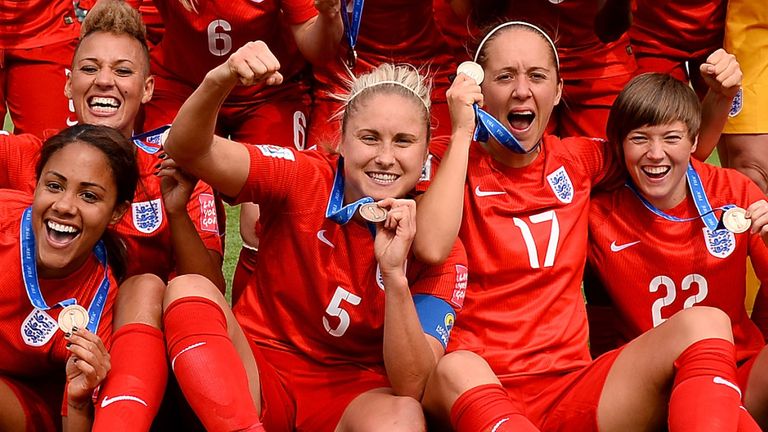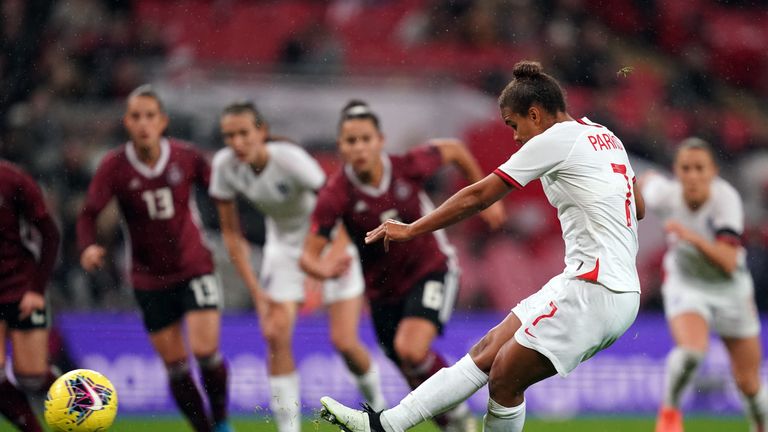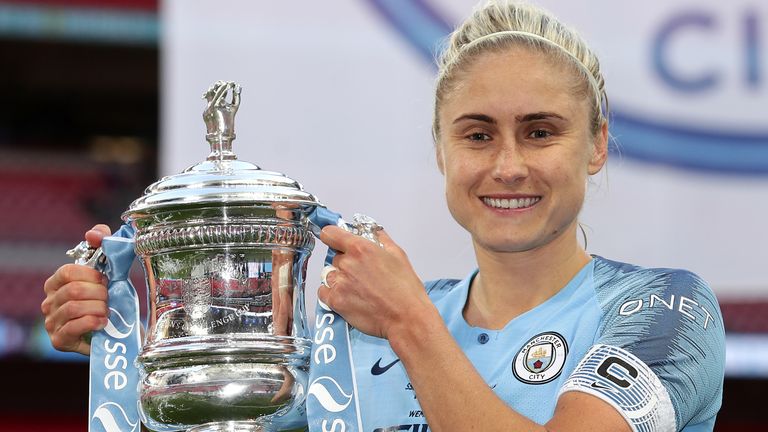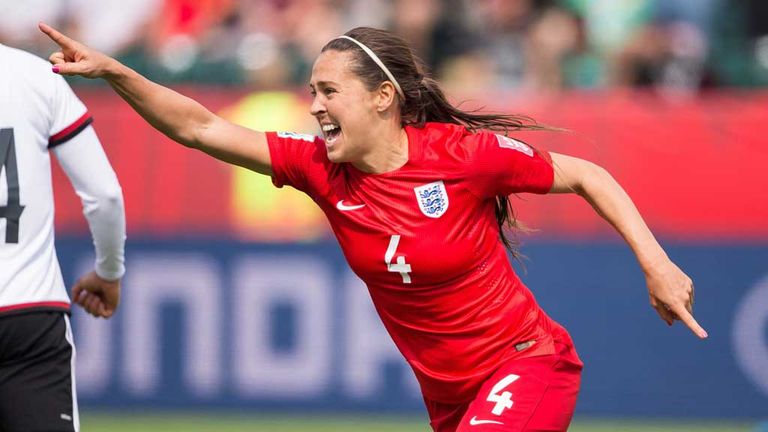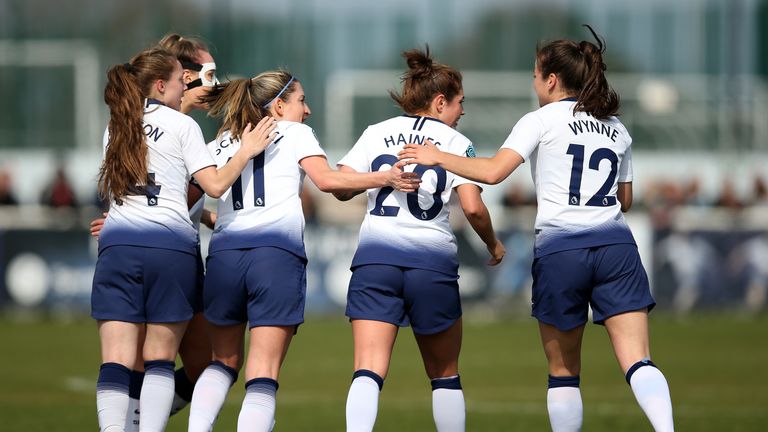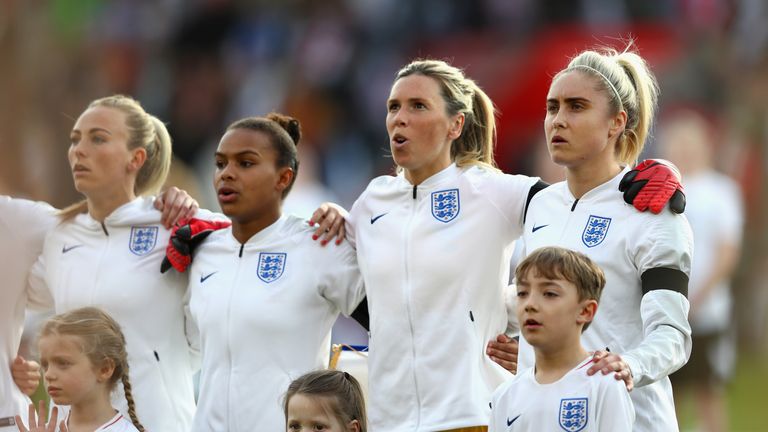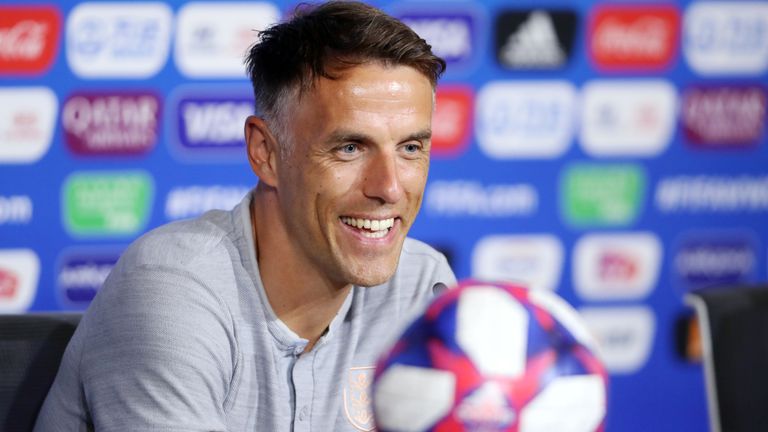A defining decade for women's football
Steph Houghton: "I knew as soon as I was playing for England and all of these clubs that I wanted to make it better for young girls growing up and give them a chance of playing football for a career"
Tuesday 31 December 2019 10:19, UK
The popularity of women's football is growing rapidly, with the 2010s a defining decade for the game.
Ten years ago, there were no professional women's teams in England and there was little recognition for female players. Now, the Women's Super League has been professional since 2018 and all players are paid to play full-time.
There has also been a huge improvement at international level. England Women recently registered the highest attendance for a home international women's game in England when 77,768 watched them play Germany Women at Wembley.
The Lionesses also made history in 2015 when they finished third at the Women's World Cup - the highest finish by any England team since 1966 - and followed this up with another semi-final in 2019. Scotland Women have also made their debuts at major tournaments over the last two years, reaching Euro 2017 and the 2019 World Cup for the first time.
Here, England Women captain Steph Houghton, Sky Sports pundit Sue Smith and Sky Sports Football journalist Charlotte Marsh reflect on a defining decade for women's football.
Trending
- Rogers doubles Aston Villa lead vs struggling Man City LIVE!
- Szmodics returns for Ipswich, while Willock starts for Newcastle LIVE!
- Fullkrug starts for West Ham vs Brighton LIVE!
- Mee in for injured Pinnock as Brentford host Nottm Forest LIVE!
- What time are Usyk and Fury in the ring?
- Lang with all four as Pompey lead Lampard's Coventry! | All EFL LIVE on Sky Sports+
- World Darts Championship: Dobey headlines afternoon session LIVE!
- Rangers vs Dundee team news LIVE!
- Live on Sky - Crystal Palace vs Arsenal preview: Eze out for hosts
- PL Predictions: More dropped points for Arsenal at Palace?
How far has women's football come in the last decade?
Smith: "It's massively changed from when I first started playing, but even just in the last ten years, the fact that the Women's Super League is now professional and full-time is a massive boost. It's a huge improvement that the top league are all playing full-time and it increases the standard and levels of play.
"England players were also put on a central contract which helps, so we've gone from being semi-professional or completely amateur to actually getting paid to play for our country and our club and that is going to help when you're training every day rather than having to fit in work, college or school. It will help the players individually and collectively as a team.
"If you're looking at grassroots level, the amount of girls teams that young players can join has increased too. The majority of us probably started playing for a boys team because there wasn't an opportunity but they are there now. The FA have put a lot of things in place to allow young girls to play and it's the norm now. You go into schools now and girls and boys both play football, whereas it used to be the girls would play hockey and netball and the boys would play football. I think if a girl wants to play football, it's accepted, it's pushed, if you like, and the opportunities are there now.
"You look at the crowds from a few years ago to now, people want to go and watch women's football and I think that's because we're successful and the standard is getting better."
Houghton: "It's been massive and it's gone so quick, especially the last few years. With the Olympics, the World Cup and being on television more, it's been fantastic. There is a lot more interest in what's going on in women's football and clubs like Manchester City, Arsenal and Chelsea are paving the way and really investing to give women the chance to be professional players.
"I remember leaving senior school and considering my options. I knew I wanted to play football but at the same time I knew I would have to work as well, whether that be doing little coaching jobs or going in and helping at schools to get some money. People can still do that but now they have got a chance of really aiming to be a professional footballer. Back then it wasn't really an option.
"I'm proud to be leading the way. I knew as soon as I was playing for England and all of these clubs that I wanted to make it better for young girls growing up and give them a chance of playing football for a career and being able to help their families. I feel as though we have done that, not just myself, there are a lot of players that have really led the way in terms of making women's football better and being the ambassadors and heroes for young girls along the way.
"The Olympics in 2012 was my standout moment and playing at Wembley in front of 70,000 fans. For us to be part of the Olympics first and foremost was an achievement but to get that many people to watch us was something we'd never done before and got people interested."
Marsh: "For me, the catalyst for the incredible growth of women's football, especially in England, can be traced back to the Lionesses' third-place finish at the 2015 Women's World Cup in Canada. I can remember watching the historic win in my bedroom having followed the Lionesses through their campaign and, as a newly-qualified sports journalist, praying it would be a watershed moment for the game.
"Since then, we have seen more and more female footballers enter the mainstream media - Alex Scott and Eni Aluko are just two who have earned praise for their punditry - and women's football is far more accessible in 2019 than it has ever been before. Games are regularly shown on TV, female players are now paid to play and at the bigger clubs, train alongside their male counterparts. Only a few years ago, trying to achieve these things was a constant struggle.
"One of my highlights was working at Wembley when England Women broke the record for attendance at a women's home game in England in November. It was an incredibly humbling occasion where the female players were treated like the heroes they are.
"The stands were packed full of kids and plenty of girls were there to watch their idols, giving them the belief that they could one day be a professional footballer, perhaps for the first time ever. Before now, there had been little chance for young girls to see women like them shining on the biggest stage, but that is changing all the time. That is one of the measures of how far women's football has come - by being a true inspiration for girls around the UK."
What are your hopes for the next decade?
Smith: "I think the continued growth really, so more young girls wanting to play football, the standard improving even more and growth of the fanbase. We've had lots of fans for one-off England games when they've played at the West Ham stadium, Anfield or Old Trafford, you'll get the fans there and they will want to go and watch because it is at a big stadium. But week in, week out, can we get a lot of fans at the grounds that the clubs play in? That would be fantastic.
"It would be good if the elite league was not the only one that was full-time professional, but the Championship and lower down so they're at least getting paid to play, then some of those players may be able to go on and play for England because they're having that full-time training.
"So more crowds, more funding, more sponsorship. It's great at the moment, but if we can keep building on that, where could we go? Hopefully very far and from an England perspective, going on to win something like the Euros, the World Cup or the Olympics as Team GB. That would then raise the profile and take it to the next level."
Houghton: "There's a lot more to achieve. At the minute there are only 10 or 11 clubs that are professional and it's important that we strive to get as many clubs as possible to that level so that girls can achieve their ambition of becoming fully professional. I'd like to see more people at games and more games on television, that has to be the ultimate plan over the next 10 years.
"Personally, I want to try and play as long as I can at the highest possible level. I don't think I'll play for another 10 years, maybe a couple more. Hopefully I can win trophies at Manchester City and a major trophy with England and after hopefully more media work and being involved generally with football.
"I love the media work, there are so many great people I have been able to work with and I love watching football as it is, so sitting, watching and talking about football is perfect."
Marsh: "It's quite simple really - fans need to get into the stands and support women's football or it could lose the recent momentum. More support will lead to more funding, therefore improving the quality and developing stars for the future. Women's football will only continue its development with the help of others.
"While the Women's Super League is now professional, it would be wonderful to see even more teams and leagues paying their players to be full-time footballers. In 2019, that some women in the lower leagues hold down full-time jobs, raise families and still train and play games for their clubs is incredible.
"Phil Neville also has a huge responsibility on his shoulders over the next few years too. He will be coaching the Team GB side for the 2020 Olympics before leading England into a home European Championships in 2021 where the Lionesses will be one of the favourites to win the tournament. That would only boost the profile of women's football further and start the next decade in the best way."
